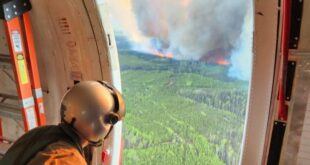'It really did create some chaos with our supply chain,' says manager of Délı̨nę Co-op store

When Yellowknife's evacuation order went out last month, city residents had until noon on Friday, Aug. 18, to leave the capital. That Friday, Yellowknife Co-op manager Justin Nelson said his store was packed with shoppers from nearby Behchokǫ̀, filling their carts with weeks' worth of groceries.
The Behchokǫ̀ shoppers were preparing for what would be a supply chain disruption that soon left some N.W.T. communities with empty grocery shelves and skyrocketing prices as freight came from Edmonton rather than the evacuated N.W.T. capital.
"They were the longest lines I've ever seen in the store," Nelson said of that busy Friday.
Now that Yellowknifers are returning home and services returning with them, food retailers in the territory say their formerly barren shelves are stocked once more and that government programs are helping offset some of their additional costs.
Dave Dyment is the general manager at the Délı̨nę Co-op. He says shelves in his store are once again "pretty much full," but at the start of the month the store was in short supply, if not completely out of, milk, bread, flour, fresh meat, chips and cigarettes.

"It really did create some chaos with our supply chain," he said.
In Łútselk'e, Co-op manager Joe Yatkowski said the store's regular shipments at their regular costs resumed Friday.
Yatkowski had previously described barren shelves and freight shipments billed at ten times their usual price. Normally, he said, Łútselk'e would have received seven flights a week, with about half of them carrying the bulk of their food shipments. Throughout Yellowknife's evacuation, they received six flights total, he said.
Yatkowski was so busy this week restocking the store with three planes' worth of supplies that he was only available to respond to CBC News by email.
Government supports
Nutrition North Canada, a federal program that subsidizes remote communities' costs on certain staple foods, is covering the increased shipping costs for affected retailers in the Northwest Territories.
A spokesperson for Crown-Indigenous Relations and Northern Affairs Canada (CIRNAC), the department that administers Nutrition North, said the program covered shipping costs for products like frozen and fresh produce, milk, eggs, baby food as well as fresh and frozen meat, poultry and fish.
Spokesperson Matthew Gutsch said Nutrition North would be reimbursing retailers who incurred initial costs.
CIRNAC did not respond to questions of whether it would be paying the full price difference between usual shipments from Yellowknife and temporary shipments from Edmonton.
Dyment and Yatkowski both said they were informed about an increase in the Nutrition North subsidy but were not aware of details.
About 4,500 kilograms of donated food and supplies also arrived in the territory this week to offset the supply disruptions.
The territorial government partnered with Toronto-based charity Second Harvest, which is focused on food security. The charity sourced food from producers, processors and retailers across Alberta to deliver about 1,100 kilograms of food each to Behchokǫ̀, Colville Lake, Łútselk'e and Fort Resolution.
Winston Rosser with Second Harvest said those communities were selected based on need, and ability to connect with leaders in those communities.
Yatkowski said that he isn't involved with the Second Harvest shipments but that he's glad to see the supplies arrive in the community. He said in the coming weeks he plans get everything sorted to access supports that will help with the extra shipping costs.
He also said he hopes to make plans in case next year's wildfire season puts them in a similar position.
ABOUT THE AUTHOR
Natalie Pressman is a reporter with CBC North in Yellowknife. Reach her at: natalie.pressman@cbc.ca.
*****
Credit belongs to : www.cbc.ca
 MaharlikaNews | Canada Leading Online Filipino Newspaper Portal The No. 1 most engaged information website for Filipino – Canadian in Canada. MaharlikaNews.com received almost a quarter a million visitors in 2020.
MaharlikaNews | Canada Leading Online Filipino Newspaper Portal The No. 1 most engaged information website for Filipino – Canadian in Canada. MaharlikaNews.com received almost a quarter a million visitors in 2020.






